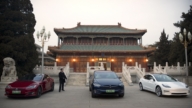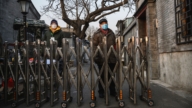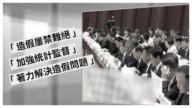【新唐人2011年3月22日訊】中國人民銀行宣佈,3月25號起,將上調存款準備金率0.5個百分點,這也是中國今年以來的第三次上調存準率。上調後大型金融機構的存準率將達到20%,中小機構則為16.5%,幾乎達到了極限。巿場預期,在通脹問題依然嚴重下,升息的腳步不遠了!但專家憂心,升息將導致人民銀行的負債問題越來越沉重。
人民銀行宣佈將上調存款準備金率0.5個百分點。據估計,這將凍結約3600億元的銀行資金,減少約50億元的淨利息收入。
《路透社》19號報導,中國2月份「消費者物價指數CPI」仍居高不下,同比上漲4.9%。而「生產者價格指數PPI」同比也上漲了7.2%,創近兩年半以來新高。
中國光大銀行宏觀經濟分析師盛宏清博士認為,目前中國通貨膨脹的壓力還是很大,上半年CPI可能突破5%,巿場預期會有新一輪緊縮政策,人民銀行將進一步加息。
這個月18號,英國《金融時報》中文網特約撰稿人陳紹霞在專文中指出,中國商業銀行的存貸比上限為75%,因為2009年以來商業信貸規模快速增長,一些商業銀行的存貸比不斷上升,紛紛逼近甚至超過75%的安全上限。
理論上,「存款準備金率」的最高上限為25%。也就是銀行吸收的存款75%用來發放貸款,25%用來上繳存款準備金。但如果除了貸款外,其他全部用於上繳法定存款準備金,銀行將面臨流動性風險。因此存準率的上限約為20%至22%。再上調存準率的空間已有限。巿場預測,加息將成為接下來抑制通脹的主要手段。不過專家憂心,加息將導致人民銀行負債的成本上升。
專文指出,中國持有的巨額外匯儲備餘額常被理解為擁有巨額財富,但人民銀行其實也揹負著巨額的債務。2010年底,中國外匯儲備餘額為28,473億美元,從資產負債表可以看出,2010年底,人民銀行的總資產25.93萬億元,其中外匯資產折合人民幣20.67萬億元,自有資金只有219.75億元人民幣,如果把它理解為淨資產,人民銀行的負債率將高達99.1%。而人民幣持續升值,等於是外匯資產持續貶值。
人民銀行持有的外匯資產,以美國、歐洲、日本等國國債和銀行存款為主,2008年金融危機以來,各國利率降到歷史最低水準,因此外匯收益率大幅下降,但以人民幣計算的負債成本卻不斷上升。因為利率每上升1%,人民銀行的利息支出將增加約2000億元。因此,陳紹霞認為,人民幣一次性大幅升值的可能性很小,比較可能採漸進方式升值。他還表示,在未來相當長的一段時間裏,中國社會恐怕難以擺脫這種「實際利率仍將處於負利率狀態」。
新唐人記者曾耀賢、李月綜合報導。
China Bank More Indebted?
People』s Bank of China announced an increase
of deposits held in reserve by 0.5%, to 20%.
This is the third time the ratio is raised this year.
For smaller institutions, the ratio is 16.5%.
This means interest rates will rise soon.
Experts worry the bank will be more indebted.
People』s bank will raise the reserve ratio by 0.5%.
This will lock up RMB 360 billion,
and reduce interest income by RMB 5 billion.
According to Reuters, in February,
China』s consumer price index (CPI)
was 4.9% higher than the same period last year.
Producer price index (PPI) is 7.2% higher.
Macro-economist, Sheng Hongqing, said China』s
inflation pressure is high and CPI may reach 5%
by July. Fiscal policy may tighten,
and interest rates may rise.
A Financial Times article points out that
commercial banks set the limit of 75%
as the ratio of deposit that can be used for loans.
Commercial loans increased rapidly since 2009,
and some banks raised the deposit loan ratio
to approach the 75% critical limit.
Theoretically, upper limit for reserve ratio is 25%.
Banks can use 75% of deposits in loans,
and 25% in reserve. But to maintain cash flow,
banks cannot use all non-loan funds for reserve.
So reserve』s upper limit should be 20-22%.
China Bank has little room to raise reserve ratio.
Raising interest rate will be used to deter inflation,
and the bank will incur further debt.
China』s huge foreign reserve is often seen
as an asset, but Chinese banks also owe huge debts.
In 2010, China』s foreign reserve
was US$2847.3 billion. People』s Bank』s total assets
were RBM25.93 trillion, including foreign assets
of RMB 20.67 trillion. If its own fund
of RMB 21.975 billion is net asset, People』s Bank』s
debt ratio must have been 99.1% in 2010.
RMB appreciation will devalue foreign asset.
People』s Bank has assets in the U.S., Europe
and Japan, where interest rates are
the lowest in history. Each 1% increase
in interest rate will mean adding a
RMB 200 billion debt to People』s Bank.
The Financial Times article believes
RMB will appreciate slowly in the near future,
and the de facto interest rate will remain negative.
NTD Reporters Zeng Yaoxian and Li Yue


























